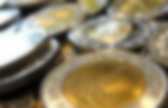

Turkish Economist: Egyptian Coup Was Economic. Traders work at the Egyptian stock exchange in Cairo, July 4, 2013, a day after the military ousted the country's president.

(photo by REUTERS/Louafi Larbi) Author: Taraf (Turkey) Posted July 12, 2013.
Rebuilding after the Arab Spring. The Brotherhood and Egypt's Economy.... Economic Liberalization in Egypt: 1990-2005. Egypt and IFIs. Business & Politics in Egypt. Periodic reminder to freak out. … about Egypt's economy — generally, with all the excitement about politics, it just isn't done enough.
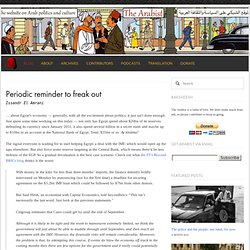
Just spent some time working on this today — not only has Egypt spend about $20bn of its reserves defending its currency since January 2011, it also spend several billion in a secret stash and maybe up to $10bn in an account at the National Bank of Egypt. Total: $35bn or so. Ay khidma? The signal everyone is waiting for to start helping Egypt: a deal with the IMF, which would open up the taps elsewhere. But also force some reserve targeting at the Central Bank, which means there'd be less defense of the EGP. With money in the kitty for less than three months’ imports, the finance ministry boldly intervened on Monday by announcing (not for the first time) a deadline for securing agreement on the $3.2bn IMF loan which could be followed by $7bn from other donors.But Said Hirsh, an economist with Capital Economics, told beyondbrics: “This isn’t necessarily the last word.
Labour in Egypt. The Egyptian Agricultural Sector. A Year In Office: Morsi’s Economic Mistakes. “I have made many mistakes,” conceded Egypt’s President Mohammed Morsi in a major speech last week after just one year in office.
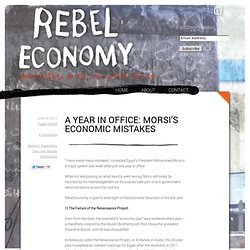
While not elaborating on what exactly went wrong, Morsi will today be haunted by his mismanagement as thousands take part in anti-government demonstrations across the country. Egypt’s New President: Political and Economic Challenges. The new president of Egypt will face myriad political and economic challenges.
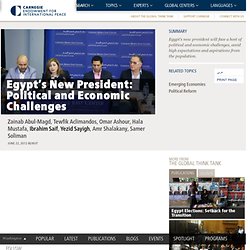
On the eve of the announcement of the presidential election results, the Carnegie Middle East Center hosted a round table discussion about the difficulties facing the next president and the consequences his first few months in office will have on the country and the entire region. Carnegie’s Yezid Sayigh moderated the discussion.
Great Expectations. Egypt’s Looming Fiscal Crisis. Regardless of who is elected, one of the toughest challenges the new president of Egypt will face is to secure the hefty US$22.5 billion needed to finance the deficit of the recently released state budget for the fiscal year (FY) 2012-2013.
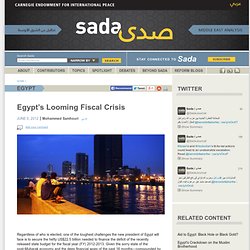
Given the sorry state of the post-Mubarak economy and the deep financial woes of the past 16 months—compounded by the political unrest and uncertainty likely to persist even after the inauguration—this will be a daunting task. On June 4, the government finally submitted its new FY 2012-2013 budget to the parliament for ratification—two months past the April 1 deadline. The interim cabinet had endorsed the budget on May 17 and presented it to the ruling Supreme Council of the Armed Forces (SCAF) for approval. Post-revolution fiscal troubles started with the present FY 2011-2012 budget—the first one put together after Mubarak was overthrown. Neither of these is likely to be available to finance next year’s deficit. Challenges of Egypt's Economic Transition.
The Army and the Economy in Egypt. [This is a translation of a Jadaliyya article that was originally published in Arabic.
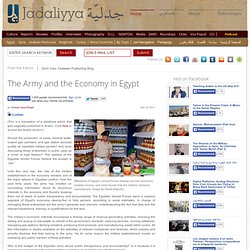
Click here to access the Arabic version.] Should the production of pasta, mineral water, butane gas cylinders, and gas station services qualify as classified military secrets? And does discussing these enterprises in public pass as a crime of high treason? The leaders of the Egyptian Armed Forces believe the answer is “yes.”
To sort.. In Egypt’s bread, signs of economic weakness. While fertile land is abundant in Egypt, particularly along the Nile, the country relies on foreign producers for nearly all of its agricultural needs — including wheat.
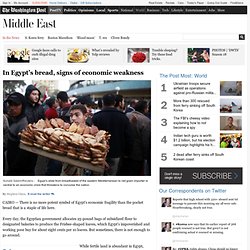
And though the state sets prices on basic goods such as bread and heating oil, when the cost of imported commodities goes up, the underground economy flourishes. Some bakers sell their flour allotment on the black market instead of making bread, prompting shortages, long lines and, sometimes, unruly crowds. Egypt’s slide from breadbasket of the eastern Mediterranean to net grain importer is elemental to an economic crisis that threatens to convulse the nation. Today, Egypt imports about 80 percent of its agricultural products, and with a currency devaluation expected sometime this year, consumers are bracing for more costly foreign goods across the board.
The country labors under a chronic balance-of-payments deficit. ‘Everything starts with the farm’ The U.S. role E-mailed requests to USAID for comment were not returned. Egypt is looted, but the U.S. press calls it 'reform' Joseph Stiglitz One of the more annoying and dishonest features of the mainstream American media over the past couple of decades has been its use of the word “reform,” without quotation marks, as shorthand for a set of controversial economic policies the United States and global institutions like the International Monetary Fund have imposed on the poor nations in the global south.
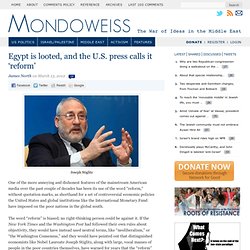
The word “reform” is biased; no right-thinking person could be against it. If the New York Times and the Washington Post had followed their own rules about objectivity, they would have instead used neutral terms, like “neoliberalism,” or “the Washington Consensus,” and they would have pointed out that distinguished economists like Nobel Laureate Joseph Stiglitz, along with large, vocal masses of people in the poor countries themselves, have warned for years that the “reform” policies are a slow-motion disaster. An earlier Post article showed how the U.S. Instead of wasting $10 million on their think tank, U.S. US / Egypt relations. In Egypt, corruption cases had an American root. Today, Gamal Mubarak and four of those think tank members are in jail, charged with squandering public funds in the sale of public resources, lands and government-run companies as part of a dramatic restructuring.
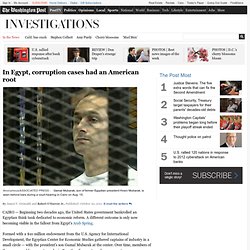
Some have fled the country, pilloried amid the public outrage over insider deals and corruption that toppled President Hosni Mubarak. “It became a crony capitalism,” Magda Kandil, the think tank’s new executive director, said of the privatization program advocated by its founders. Because of the corruption, the center now estimates, the assets that Egypt has sold off since 1991 have netted only about $10 billion, $90 billion less than their estimated worth.